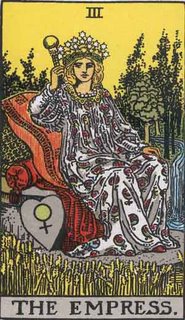Confessions of a Plot Reader
So... For all my literary aspirations, mostly snobish choice in books and criticism of modern prose, I confess: I am The Empress and I am a plot reader.
I am such a plot reader that, yes, I occasionally do enjoy literary 'candy.' In fact, as much as it shames me to confess this (can I do it? CAN I...?) Well... I actually enjoyed the clunky prose and predictable outcome of The Da Vinci Code... I also felt totally ashamed for having liked it when the book was so incredibly put down by serious readers, literary critics and writers all over -- from my then book club, to literary circles/blogs/articles on the internet and in other media. So, I've been struggling with this for a while... If I liked 'that atrocious book', does than make me a mindless moron fit to read nothing but cotton candy?
Well... Not necessarily... I mean, I enjoy literary fiction as much as the next very snobbish reader, but the point remains, like in my previous post: who cares how incredibly well-written a book is, how miraculous its prose, how beautiful its imagery, if it has no plot or if the language, use of allegory/metaphor/whatever is just so high-level, so rich that nobody cares to read it because it doesn't really tell a story or the story is depressing, or only 3% of the population even gets what said story is even about?
And, in any case, it's not like I ever thought The Da Vinci Code was a masterpiece of modern literature or anything, but I did think it was engaging enough and a fast read... 'Decent' (yes, decent) airplane literature and nothing more. And I can totally understand how, regardless of its faulty prose, overabundance of cliches and other gazillion literary faults, it made it to the top of the best-seller list for god knows how many weeks in a row. It simply rehashed AND successfully marketed a contentious theory that's been out there forever. Let's face it, even in this day and age, and in the Western world, anything that challenges age-old religious dogmas/beliefs, is automatically interesting to a huge percentage of the population -- hell, that's the reason why I went out and bought the book. Dan Brown merely figured out how to profit from one of said challenges on traditional beliefs. Then he added a dash of this and a dash of that, and tossed everything like a great big nonsensical salad of secret societies and imagined church conspiracies. I'm amazed he didn't throw in the Masons, too, or the International Order of Oddfellows or the Sunshine Sisters (or did he? I can't remember... So memorable the cotton candy lit was...), or imply that somehow McDonald's and Coca-Cola were profiting from said church conspiracies, too (again I ask: did he?) So, he took from here and there to create the theme, tossed in a couple of cardboard characters and form mystery settings, chases, 'twists', and voila: you have a genre piece.
That's right: A genre piece. A light, fluffy, cotton candy genre piece. Not literary or even general fiction, where the writing itself is generally expected to be better. A genre piece. And the point remains that, no matter how much everyone has torn it to pieces, they finished the book. If it were that atrocious, wouldn't they just simply stop reading?
I liked it because it did what I figured it would do: it entertained me. It was a breeze to skim past the repetitive or cliched language and focus on the immediate, on the fact that I was being entertained... much like watching a blockbuster movie: you pretty much resign yourself to the fact that it's going to be bad and/or full of cliches and... well... either enjoy the ride or get out of the movie theatre... If you go see a good art flick, instead, then enjoy, deconstruct, analyze to your heart's content... It's the same with books: people who want to enjoy a smart, stimulating read will pick up something by Carol Shields or Alice Munro or Anne-Marie MacDonald... You don't go and pick up something as media-hyped as Harry Potter or The Da Vinci Code and then whine about how lousy the writing was, how predictable the plot! Let's face it: media hype is for the masses -- the same masses that watch American Idol and other reality tv crap and demand more of the same. The same masses that just want to be entertained. And while I draw the line at reality tv, and mostly read 'intelligent' fiction, I do enjoy the odd immediate satisfaction book (namely the two examples above)... who cares if the prose/plot could be better? Sure as hell, Dan Brown and J.K. Rowling don't give a flying f*&k. They're set for life, and no matter how badly their work is criticised, they won't have to worry about money or work ever again. I'm pretty sure that's got to give them some comfort if they still bother to read negative criticisims of their ouvre.

